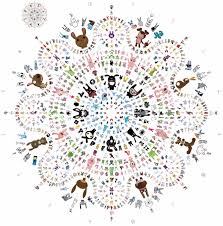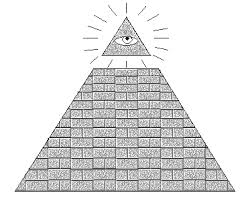“I learned a new word in school today, mommy.”
“I learned a new sentence in school today, mommy”
Which of these two sounds strange? Why?
I claim, always for the sake of argument, that our
schooling teaches “sentence” knowing, that we swim
in sentence-knowing—not WORD-making. We learn
packages & parcels rather than parts & pieces. We
learn SENTENCES in school, our
not word-wording. .
WORD!
(You hear folks saying that, with emphasis.).
You don’t hear anyone shouting
SENTENCE !
How come?
Words are Ideas (concepts, constellations,
possibilities, potencies)

Sentences are applications, reductions, impotencies
arrows of purpose & intentionality, getRdone
instruments of expression and command....

Can you see the difference?
Between “word-ing” and “sentence-ness”?
Substantial, yes? Incommensurate: can’t measure the
values of WORD against the values of SENTENCE,
(or vice versa), true? It’d be like Freddy Flatlander
estimating (assessing, evaluating) the significance of
Sally Sphere—yes? See what I’m saying?
“WE” TEACH YOU GUYS in “SENTENCES”
not in “Words”—so to speak. All your schooling
has been Sentence Schooling not Word Schooling.
Need we argue?
Rationalizing my irrationality: my courses intend to turn up
the mess, confusion, random chaos resourcefulness
prior to syntax & the making of sentences. primordial,
not yet logical: the I’m-lost-&-we’re-not-going- anywhere
prerequisite to eureka and heuristics. Makes good sense
that they feel that way. Used to Sentence Education.
“WORD” puts IT in play. IT, I said. Ice Cream in Hell:
are they just going to Get Along?
EPISTEMOLOGY
Epistemology : epi system – literally: to stand upon.
The study of our standing-upons so to speak, but in
academic circles: how we know as opposed to
what we know: a process vs product distinction, a
media vs message distinction, a context vs text distinction.
forms & structures vs content distinction, the distinction
between conceptualization & information.
(The heart of thinking: drawing distinctions.)
3 words (concepts really) that stand-for my current
frame of minding and bed-rock old age fundamental
rumination would be:
1) Relationship and 2) Representation
and the $20 term quite popular these days
& more sophisticated sounding than R & R
(above) 3) EPISTEMOLOGY
“Epistemology” already comes carrying the sound &
fury of high academic seriousness; it's the other two
(relationship and representation) that I want to hype,
so that they might stand-for the essence of thinking,
communicating, and conversation.
and representation are the Archemedian ground on which
we stand (episteme) and lever our experience:
knowing (epistem-ing)

relationship.............................. representation
That triad.
Mary Catherine Bateson acknowledges that her dog
reminds her that EPISTEMOLOGY (theories of how-
we-know as opposed to what-we-know; process as
opposed to product, media as opposed to message)
is a matter of RELATIONSHIP.
“I have also relied on the companionship of a large,
sweet
EPISTEMOLOGY is indeed a matter of
RELATIONSHIP and comforts me for
the
Angels Fear: Toward an Epistemology of the Sacred
..........................Relationship / \ Representation
 ............
............
I) Turn IT up: Dog & Mary Catherine
II) Put IT in play: imagine the Relationship,
back & forth, back & forth, back & forth
(how else would you characterize relationship?)
III) Represent: show & tell; names and images,
terms & pictures characterizing the dog-&-Mary
Catherine “system” ( &episteme)
Knowing (episteme) is always (in the biblical
sense & secular) a relay, a relationship, a ratio,
a rationalization, a reciprocity. Never unilateral
(no matter if it feels one-sided) and of course
always a matter of re-presenting: representation
(show & tell, tell & show)
Or you describe it your way:
KNOWING (not to be collapsed, conflated or confused
with Knowledge). We'll put IT in play.
Or what's a college for?

Gregory Bateson and Mary Catherine:
co-authors of Angels Fear.


No comments:
Post a Comment